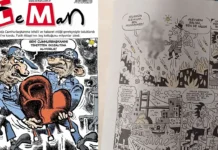The court case in New York against Turkish-Iranian gold trader Reza Zarrab on charges that he violated US sanctions on Iran through Turkish banks by bribing Turkish government and public bank officials is a “political plot” against Turkey, has claimed Turkish Deputy Prime Minister Bekir Bozdağ, a week before the key jury trial.
“We make no secret of it: This is a political case and does not have a legal basis. It is a plot against Turkey. The prosecutors have been openly imposing pressure on the accused,” Bozdağ told reporters on Monday after a weekly cabinet meeting.
“This case is nothing other than a repeat of the failed legal coup on Dec. 17 and 25, 2013 by the FETÖ (a derogatory term coined by the ruling Justice and Development Party (AKP) and Turkish autocratic President Recep Tayyip Erdoğan to refer to the Gülen movement) against our government, this time through the US justice system. None of the so-called evidence in this case is legal,” he said, referring to the December 2013 corruption cases.
Reza Zarrab was the prime suspect in a major corruption investigation in Turkey that became public in December 2013 in which with others from the inner circle of the ruling AKP government and then-Prime Minister Erdoğan for having paid Cabinet-level officials and bank officers bribes to facilitate transactions benefiting Iran.
After Erdoğan cast the case as a coup attempt to overthrow his government orchestrated by his political enemies, several prosecutors were removed from the case, police were reassigned and the investigation into Zarrab was dropped.
A jury trial in the Zarrab case is slated for Nov. 27, amid speculation that the Iranian-Turkish trader has agreed to cooperate with the US prosecutors in return for a witness protection program to be granted by the court.
“He is in a sense taken hostage,” Bozdağ claimed, alleging that Zarrab is “under pressure from prosecutors to become a confessor and to make accusations against the Republic of Turkey.”
“[The court] says FBI agents have confirmed [the evidence]. Are there documents to confirm this? Is there any importance of the confirmation of an FBI agent? No,” he added, questioning the legality and validity of evidence to be introduced to the court.
“Some evidence in the dossier is related to the December 2013 corruption operation, including recordings of phone conversations of senior government figures. All former judicial and police members of FETÖ who were involved in the 2013 operation have been removed from their jobs and many of them have already been jailed,” Bozdağ said.
“How could an FBI agent judge that these recordings and other information within the dossier are accurate?” asked Bozdağ and by labelling the material evidences as “fabricated” and described the Zarrab case as a “new plot against the government.”
On Saturday the İstanbul Chief Public Prosecutor’s Office launched a criminal investigation into Joon Hyun Kim, acting US attorney for the Southern District of New York, and Preet Bharara, the former US attorney who was in charge of Zarrab’s case, and other attorneys over evidence used in a trial of Turkish citizens.
Zarrab and Turkey’s Halkbank Deputy General Manager Mehmet Hakan Atilla were arrested in the US for conspiring to violate US sanctions on Iran. The US District Court for the Southern District of New York on Sept. 6 also indicted former Turkish Economy Minister Mehmet Zafer Çağlayan, former Halkbank General Manager Süleyman Aslan, Levent Bakkal and Abdullah Happani and ordered arrest warrants for them.
Meanwhile, Turkish Deputy Prime Minister Mehmet Şimşek rebuffed on Monday the claims that the functions of Turkey’s Halkbank would be transferred to another state-owned bank, Emlakbank. “There is no such thing. Turkey’s banking watchdog will make the necessary explanation,” Şimsek told reporters in Ankara, referring to the Banking Regulation and Supervision Agency (BDDK).
The claims come amid US probes into Halkbank over violations of Iran sanctions. Ankara has claimed that Halkbank did not break a national or an international law, nor did it violate UN sanctions on Iran.
“There is no work to replace Halkbank. The latest regulations aren’t related to Halkbank. The regulations were done to comply with the new trade law,” said Mehmet Ali Akben, the head of the watchdog despite the new regulations regarding the merger, division, transfer of assets, and exchange of bank shares were published in the Official Gazette On Nov. 16, 2017.
News published in the US media that Zarrab, arrested in Miami in March 2016, could have pled guilty, rang alarm bells in Ankara. The Turkish government issued a diplomatic note last week urging the US to notify Turkish authorities before relocating Zarrab to another facility. According to the state-run Anadolu news agency, Foreign Minister Çavuşoğlu said Turkey sent two notices to US authorities after Zarrab’s lawyers were unable to reach him.
President Erdoğan on Oct. 24 strongly criticized the US administration for allegedly trying to force Zarrab to give them names from the Turkish government, saying he would explain all the details.
“They are driving him [Zarrab] into a corner, trying to make him an informer by saying, ‘If you mention those names, it [your prison term] will be this long, if you mention those names it will be that long’,” Erdoğan said, adding: “We are following this. We know how to set the world on fire when all those issues are done. We will tell all.”
Erdoğan demanded the release of Zarrab as well as the firing of then-US Attorney Bharara during a private meeting with then-US Vice President Joe Biden on Sept. 21, 2016, devoting half the 90-minute conversation to Zarrab, David Ignatius wrote for The Washington Post on Oct. 12.
“Erdogan’s campaign to free Zarrab has been extraordinary. He demanded his release as well as the firing of Bharara in a private meeting with then-Vice President Joe Biden on Sept. 21, 2016, in which U.S. officials say half the 90-minute conversation was devoted to Zarrab,” Ignatius wrote.
“Erdogan’s wife [Emine Erdoğan] pleaded the case that night to Jill Biden [wife of Biden]. Turkey’s then-justice minister, Bozdag, visited then-Attorney General Loretta E. Lynch in October to argue that the case was ‘based on no evidence’ and that Zarrab should be released.”
According to former aides, “Erdoğan appealed personally about the matter in his last two phone calls with President Barack Obama, in December and early January.
“Our operating assumption was that Erdoğan’s obsession with the case was that if it moved forward, information would come out that would damage his family, and ultimately him,” said one former senior Obama official, Ignatius noted.















